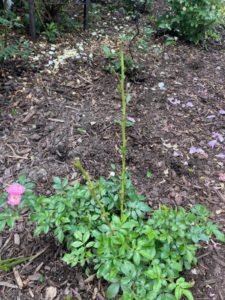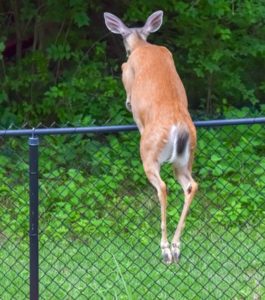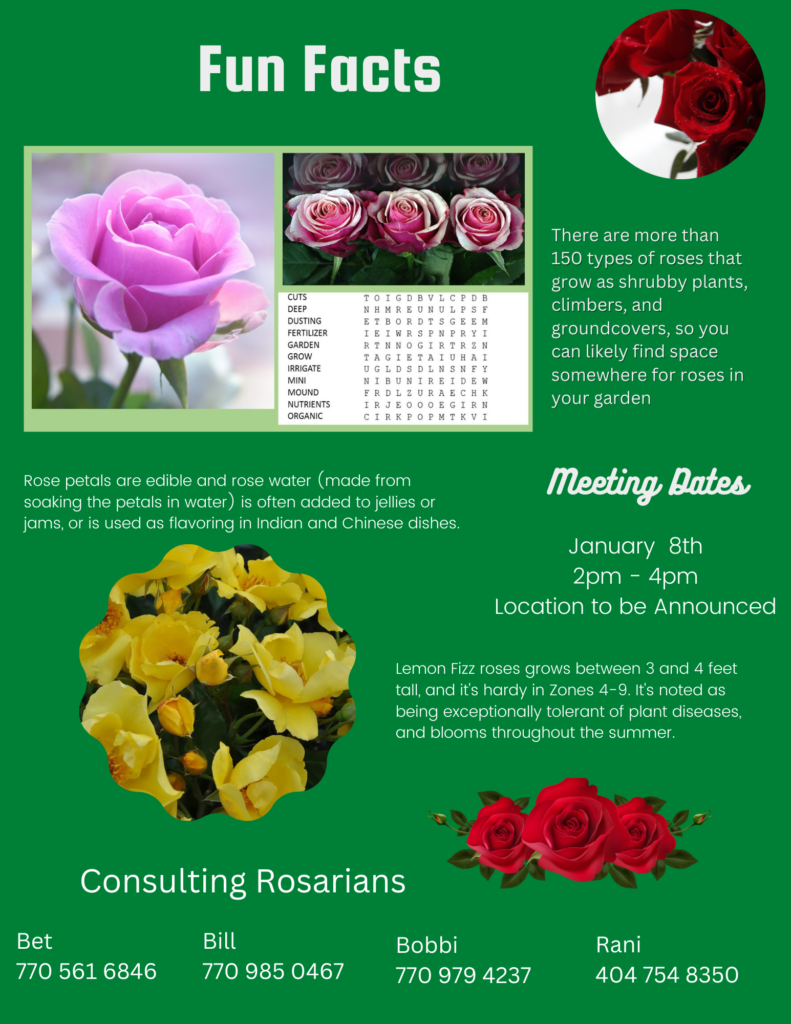Services
Member Benefits
- Monthly Helpful Seminars
- American Rose Society Discount
- Personalized Rose Care
- Garden Visits
- Bulk Purchases


Lets Talk Roses Our President
Oh Deer!
Today I am writing about something near and ‘deer’ to my heart. This year the deer have caused a lot of havoc in my garden. The combination of a colder-than-normal winter into spring, then a lot of rain, plus presumably a larger deer population have made it almost impossible to avoid extensive deer damage in my yard.
Most of my roses are in my front yard, as it faces South and gets a lot of sun. Per HOA laws, I am not allowed a fence in the front, only in the back of the house. Over the years I have added more and more roses to my yard.
I first noticed deer munching on my roses the second year I had roses. I was such a city girl neophyte that I thought someone came into my yard and cut off all my rose buds. But I was told it was deer, so the fight was on. Over the years I have been somewhat successful in preventing major damage using Liquid Fence or Deer Off regularly. This year has been a problem.
Where I live, we are near a large lake (Lake Lanier) with a lot of green belts. We even have beavers in the retention pond in the subdivision. We have turtles, coyotes, opossums, foxes, hawks all kinds of wildlife. There has even been a bear or two spotted around us. And we have deer. Lots of deer. While it’s fun to see a mama deer and her fawn in the spring, I cringe when my neighbors share these pictures. More deer to eat my roses!

Normally I spray for deer a lot in the spring, especially before the show period. Then I tend to slack off a bit. As soon as other plants are
available, the deer seem to leave my roses alone.
But that hasn’t happened this year. Add to that it has rained a LOT this year. The rain washes away the deer repellent, so it must be re-applied. But if it rains three to four days in a row,
especially at night, I can’t keep up with it. So, my roses just become tasty snacks for the deer. I know the deer come in the early morning, about 3-5 AM. I do sometimes see them if I get up very early. Each morning though, I see trails of deer tracks in the dew on my lawn. I see and smell deer scat. And of course, I see a lot of deer damage.
Show here is Garden Director Otto. The night before these two tall canes were full of new growth and buds.
The buds and leaves were completely stripped. What is particularly annoying is when you have a new rose with buds and you are dying to see the first

blooms and overnight, they are gone. That’s what happened to my Hot Princess, planted this spring.
So, what can we Rosarians do to protect our roses and other flowers that deer will devour. There are a few options.
I have been planting more roses in my fenced-in backyard. The fence is only six feet high, but the deer haven’t yet felt the need to hop over it, since there is an excellent all-you-can-eat buffet in the front, no jumping needed. If you are fencing in your yard, you may need a higher fence.
If you are fencing in your yard, you may need a higher fence. Unfortunately, the roses in the back don’t do as well because the house blocks a lot of the sun.
I’ve mentioned Deer
Repellent. I usually use Deer Off or Liquid Fence. Both smell horrible when sprayed, so be considerate of neighbors when applying. Also, some of these contain hot pepper
, so whatever you do, don’t accidently spray yourself in the face or get it on your hands (and rub your eyes). TRUST ME ON
THIS.
The spray will last very well unless it rains. Then it will need to be reapplied. I normally just apply to buds and new growth. But this year has been so bad, that the deer were eating the roses leaves with no new growth that I didn’t spray. If you want, you can make your own deer repellent. It’s easy.
Here is one recipe.

- 3 eggs
- 1 cup of water
- 1/3 cup of liquid dishwashing soap
- 1/3 cup hot sauce (Tabasco is a popular choice)
- Once you have made this mixture, put it into a sprayer (such as a gallon tank sprayer). Fill the remainder of the sprayer with water. Spray this onto and around your roses weekly.
- Make sure you do this thoroughly so that the deer can smell it. Gardeners who have used this technique say that it will not hurt your plants. One method involved hanging bars of soap around the rose garden. The bar soap method did seem to be effective for a while, but then the deer seemed to get used to it and went ahead and did their damage. Perhaps, the deer were just hungrier, and the scent of the soap was no longer a strong enough deterrent. Thus, the need to rotate whatever form or method of repellent used is important to achieve maximum protection.
Some people swear by applying Milorganite or moth balls on the ground. I think this may be more effective for rabbits because they are low to the ground. A deer will be eating higher up and those scents may not carry that far.
There are mechanical gadgets on the market that act as protective deterrents, such as timed or “electronic seeing eye” items that cause a sprinkler to come on or noise when motion is detected. Even with the mechanical items, the deer get used to them after a while.
The use of an electric fence placed all around the garden is probably the most helpful deterrent. If it’s not tall enough, however, the deer will jump over it, so a trick of baiting them to the fence may be used if desired, which involves the use of peanut butter spread lightly onto the electric fence wire while it is turned off. The deer love peanut butter and will try to lick it off, but when they do so, they get a little shock that sends them in the other direction. Seems a bit excessive, but still might be worth it. I did see a video on the internet of a Komodo Dragon downing a full-grown deer whole, but I rejected that idea since I am not much bigger than a deer and wouldn’t want to get eaten too.
Another method of deterrent protection to consider is planting a border around the rose bed of plants known to repel deer or are resistant to them. Some of these include Astilbe, Butterfly Bush, Coreopsis, Columbine, Bleeding Heart, Marigolds, Dusty Miller, and Ageratum. Contact the Extension Service where you live or a local Rose Society group for more helpful information specific to your area.
Some people use urine as a deterrent. You can buy predator urine products, or you can, um, supply your own. I’m not sure of the success of this product!
Deer Resistant Roses? Yes, there are some. I have noticed that the deer don’t munch on some of my roses. For instance, I have Golden Celebration right out front by my mailbox and it never gets chewed, while Darcy Bussell, in the same bed, is regularly chewed to the ground. If only Golden Celebration wasn’t such a blackspot magnet, Sigh.
According to WorldDeer.Org, the following roses are thought to be unpalatable to deer:
Rugosas, both natural and hybrid varieties.
Harrison’s Yellow
Father Hugo
Happenstance
Species roses such as Swamp rose (Rosa palustris) Virginia rose (R. virginiana) Pasture rose (R. Carolina)
When the Damage is Done
After you see your favorite rose with leaves stripped and no buds, what do you do?
Cut back. To at least the next leaf set that you can see.
Watering the rose bushes with a water and Super Thrive mix will go a long way in helping the roses recover from the major stress of such an attack. Super Thrive is not a fertilizer; it is a product that provides essential nutrients to the bushes at a time of great need. Do not apply large amounts of fertilizer, as the roses need some time to recover.
If the rose is being eaten low to the ground, you may want to put some netting around it so it can recover without being eaten again.
All in all, I wish the deer would acquire a taste for the cham bitter weed that tries to take over my yard each year or even the passion vine that is a staple. Although the caterpillars usually do a good job on that one.But like us, I suppose the deer just prefer roses.




Talk to us
Have any questions? We are always here. Our Consulting and Master Rosarians are certified by the American Rose Society. They are delighted to answer your rose questions
